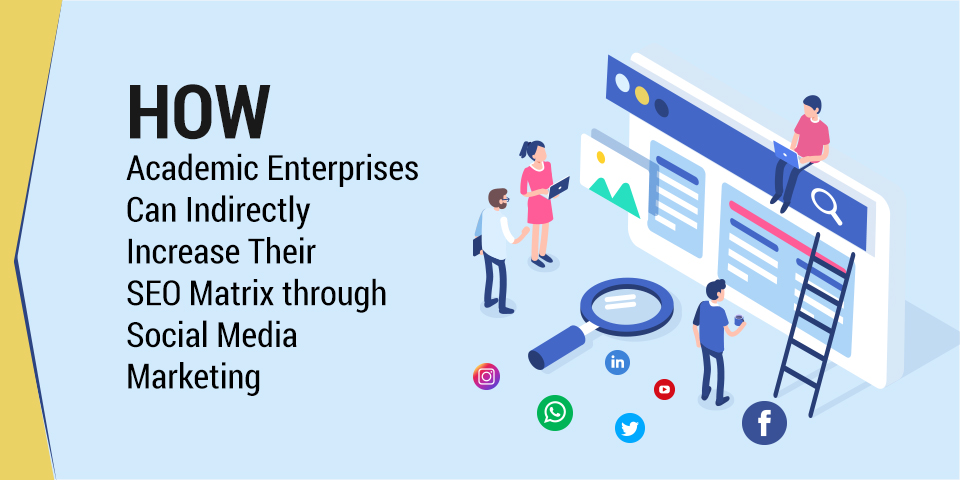How Academic Enterprises Can Indirectly Increase Their SEO Matrix through Social Media Marketing
Social Media activities indirectly affect the performance of your search engine optimization (SEO). So, let’s look at some of the important benefits for SEO that come from user interactions on social media.
In the new age of digital marketing, Google rank has become very crucial for marketers to ensure an Institute’s brand awareness among its target audiences. In this context, social media assumes an important place to make sure your college strongly supports its SEO efforts.
This thought leads to the question, “How are SEO and social media interlinked?”
SEO is no longer just about keywords, backlinks and metatags etc. Search engines are now using social media channels to determine the relevance of the information that the user is searching for.
What does this mean for your College or University? It means that social media should be taken seriously while strategizing your marketing mix.
In this blog post, we will discuss how does social media affect SEO and how you can optimize your social media accounts for SEO benefits.
Let’s dig out a little deeper and understand how social media signals impact your SEO results.
Have you ever wondered how big a role your content’s social engagement play in improving your Google indexing? In other words, “Does your social media efforts have any impact on SEO?”
The answer is: YES
Search engine optimization or SEO rely deeply on social media validation of information that user searches.
For search engines, social signals are an important metric for determining user behaviour. It includes the level of engagement in terms of likes, shares, comments, reviews, links, votes etc. you generate through social media channels. The higher the quality, value and relevance, of the content, the better its search result.
These days social media is completely transforming the ways and means of communication and influencing the user decision-making process.
But an important thing to note here is that social signals are not yet considered in Google’s ranking index.
So, how then is it possible to use social media signals that benefit SEO performance?
Here are a few indirect actions that can boost SEO rankings via social media platforms.
#1. Creating backlinks to your website using social media
This will help in driving traffic from social platforms back to your site which can, in turn, improve your Google rankings. If your content is of high quality it will be referred on other sites and people will spend more time reading it thereby improving performance matrix of your website. This will in effect give push to your SEO efforts.
#2. Using positive reviews as a metric to boost searches
Positive citations online can boost your chances of appearing in organic local searches. Reviews are an important factor in search engine marketing (SEM).
#3. Promoting brand awareness through social media
Social media can indirectly affect your SEO efforts by helping you promote content. Your social content will give you greater visibility if it is exposed to a larger audience base.
You can get backlinks on third party web pages by being active on online discussion forums such as Quora, Pagalguy etc. Alternatively, you can find more sites where your target audience is looking for answers to his / her queries and writing/reading reviews about your academic brand. By providing helpful answers and adding link of your website on these platforms you can create a credible profile for your brand.
This approach can improve your brand awareness and help in driving more traffic onto your website. By growing website traffic you can increase its ranking in search results.
#4. Use social profiles for boosting SEO
Social media marketing is a great tool to enhance institutional branding. However, it can also impact SEO indirectly through social profiles. These profile pages drive traffic to your website and help potential target audience explore your brand.
Thereafter, once people start seeing you in search results, they are more likely to take action thereby improving your search ranking.
Google and Twitter partnership is further expected to bring more power to the online search mechanism in new ways. The partnership means that Google now has access to the stream of tweets known as the firehose.
Google is all about information and people want information that is as latest as possible. Twitter can provide fresh information as it can get.
More social interactions ultimately result in more searches.
#5. Social Links
Social links can also help in boosting the search rank.
Links to your content on Facebook, Twitter, LinkedIn, Google+, YouTube and other social networks help the search engines understand what websites are credible and should be ranked for what keyword phrases.
#6. Include Social Share Buttons for SEO
Make sure your share buttons include important social signals in the form of your college name, relevant URL and hashtags. Search engines are often looking for such information as part of social signals.
Finally, Social Media Channels are the Next Generation Search Engines
Nowadays more and more people are navigating through social media channels to find search content in addition to search engines like Google or Bing.
People in your network are often tempted to check the profile of your work place using social channels. This in turn builds up the possibility of improved SERPs. They are likely to open Twitter and Facebook or YouTube and do a quick search to see what kind of place / organization you work.
By reaching out and interacting with people on social media, you can get more positive engagement metrics that consequently lead to higher SERP (Search engine results page) positions.
So, boost your organic search traffic by harnessing the potential of social media.
You can share your experiences on SEO and social media influence here in the comments section!
Further Readings:
SEO For Universities & Institutions



